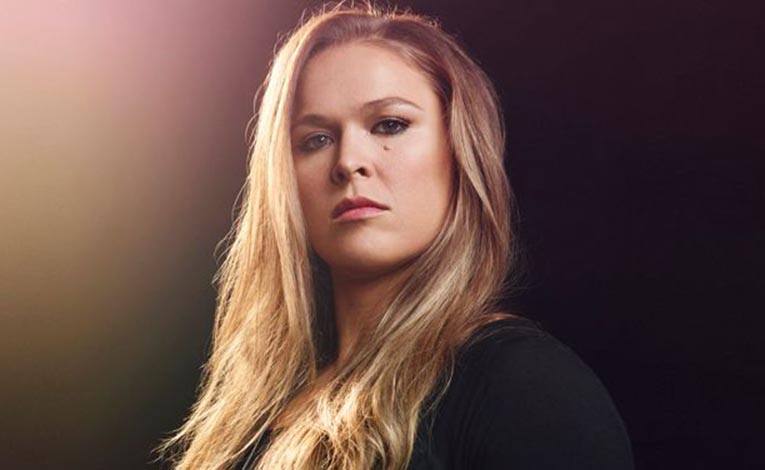Ronda Rousey is peacefully asleep inside her wee Venice Beach, California, bungalow, her breathing rhythmic, only one of her feet stirring. She’s naked, because that’s how she sleeps, not much of a threat to anyone and so unlike how she is when she’s in the Ultimate Fighting Championship’s Octagon. At times like those, she’s a broad-shouldered, evil-eyed fighting fury, capable of wicked overhand rights, various elbow strikes, thudding head punches, an entire panoply of judo throws, mounts, tosses and sweeps, and, of course, her signature fight-ending killer move, the armbar submission.
Not that the world has gotten a chance to see all of this mayhem yet. Her fights, three amateur and 11 pro, with not a single loss among them, tend to end in less than 60 seconds. At the age of 28, she has in four years become the most dominant mixed-martial-arts fighter in the sport’s history and was in fact recently named “the most dominant athlete alive,” beating out names like LeBron and Mayweather. On the fight scene, there’s never, ever really been anyone quite like her. “She’s a beast, man,” says UFC president Dana White. “She’s the greatest athlete I’ve ever worked with. With her, it’s like the Tyson era, like, how fast is she gonna destroy somebody, and in what manner? Ronda’s one in a million.”
Up in her bedroom, inside her bungalow, at a few minutes before nine, Rousey’s right foot has begun to stir a little more, maybe even twitch a few times. She’s alone there, no one to bother her, but she still needs to sleep. Her next fight, in August against Bethe Correia, is not that far off. She has to train, loves to train, never wants to stop training. Plus, whereas five years ago, after taking time off from her early career as a bronze-medal-winning Olympic judoka, she was a booze-swilling, pot-smoking cocktail waitress who was so hard up for cash that she lived out of her cheapo Honda Accord for a spell, she now has her days filled with all kinds of celebrity-type obligations, interviews, photo shoots and various calls from movie people.
Her right foot is jerking around, and her eyelids begin to flutter. The alarm clock next to her is set to go off at nine.
It is now one minute until, and suddenly, in bed, her eyes pop open. Silence surrounds her. She looks at her clock, and all she can think is “Yes! Yeah!” By way of explanation, an hour later — after she’s thrown on an old Misfits T-shirt and sweatpants, slurped down a chia-bowl breakfast (“I love the bowl! I crave it!”), said good morning to her big-galoot Argentinian mastiff, Mochi, wandered around her messy, clothing-cluttered living room, looking for stuff to throw in her backpack, and at no time giving any thought whatsoever to putting on makeup — she says to a visiting reporter, “See, for some reason, I feel like it’s a victory if I wake up one minute before the alarm. It’s like I’m in a contest with myself, with my foot kicking around until it wakes up the rest of my body. It’s the stupidest thing. But it makes me feel like I’ve already won something.”
And so this is how she lives, all day, every day, 24 hours a day, for days and days on end. It’s all about winning, in any way that she can.
Until Rousey, the UFC didn’t even have a women’s division. The very idea of two girls going at it made White uncomfortable. “I don’t want to see two women beatin’ on each other,” he told Time in 2007.
Back then, the most desirable place for MMA women was in a much smaller organization called Strikeforce. It’s where all the early great pros fought, including Gina Carano, who retired to go into movies, and Cristiane “Cyborg” Santos, who would later be stripped of her championship title for a steroid violation, and where Rousey first came on the scene, in 2011.
At the time, Rousey had an amateur MMA record of 3-0, her wins accomplished in less than two minutes total. After two equally quick victories in Strikeforce, she was given the chance to take on bantamweight titleholder Miesha Tate. This led to a nasty rivalry that continues to this day. Rousey wrote Tate off thusly: “I don’t have respect for Miesha’s inconsistency. One minute it’s about the sport, the next she is wearing booty shorts.” And later snorting, “I’m gonna talk a bunch of shit. And I’m gonna break a couple of girls’ arms, and I’m not gonna feel the least bit sorry about it.”
This got her lots of bad press, but in their early 2012 contest, she backed up her words. At 4:27 in the first round, she hyperextended Tate’s elbow with an armbar, ripping through ligaments and forcing her to tap out. Strikeforce later labeled it the Submission of the Year.
Like everyone else, however, it wasn’t just Rousey’s fight skills that caught White’s attention. “She’s beautiful, intelligent and very pro-women, which I respect,” he says. “And she is psychotically competitive.” Which is true. Take the book tour for her new autobiography, My Fight/Your Fight. She’d been dreading it, until she read some report about Kim Kardashian’s crazy new book tour and suddenly changed her mind: “I was like, ‘Hell, no! I need mine to be crazier than that! Mine’s going to be the best book tour that ever happened! Kim Kardashian, I will beat your book tour!’ ”
In this, as in all things, she will not fail, because she cannot fail, and she cannot fail because she’s a winner. It’s an unassailable logic that was first drilled into her by her mom, AnnMaria De Mars, herself a former judo champion, who, if she saw her teenage daughter relaxing in bed, say, would jump on her and attempt to get her in an armbar, the message being: Never let your guard down.
All these things made Rousey the kind of complete package and talent that convinced White and the UFC that women at a fight could be more than card-girl eye candy. In late 2012, he announced the formation of a women’s division, installing Rousey as its bantamweight champion. Her record now stands at 5-0. Most recently, she took on Cat Zingano, a match that ended with an armbar in 14 seconds, making it the fastest title fight in the UFC’s 21-year history. Rousey reportedly got $130,000 for the win, after which she renegotiated her contract for an undisclosed but presumably far grander amount and one better suited to her new role as the UFC’s biggest star.
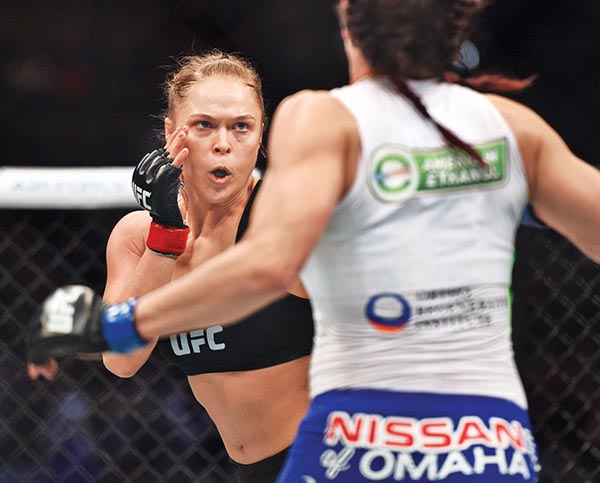
Along the way, the only fighter to get past the first round with Rousey in the UFC has been Tate, who during their 2013 rematch managed to make it to the third round before once again finding herself on the mat, with Rousey bending her elbow back against the joint until she tapped out rather than have it broken. It was another winning armbar. Afterward, she offered her hand to Rousey, but Rousey refused to shake it. The blood between them was that bad, a situation that had been compounded when they faced off as opposing coaches on Fox Sports’ UFC reality show The Ultimate Fighter, with Rousey constantly giving Tate the finger and snarling stuff like, “Fuck you, bitch!” The end result of all this has been to turn Rousey into what the pro-wrestling world calls a heel, the fighter everyone loves to hate. Rousey’s response has always been, “I like it that way.”
“There are certain things I admire about her as an athlete and a fighter,” says Tate, “but I don’t respect her as a person. There’s an ugly side to her. Yeah, she’s just nasty.”
Zipping along the highway in her messy white Range Rover toward her gym today, the hard-case Rousey is not exactly the one on display. She’s laughing loudly and talking about her 2013 fight with Liz Carmouche and how at one point, her bra nearly got tugged aside. “I have a weigh-in bra that’s smaller and lighter and I’m a girl, so it’s cuter, too, and I wanna look cute,” she says. “But on fight night, who cares about looking cute? It needs to be effective, only on that particular fight night, I didn’t have an effective bra. I just had two cute bras, so I had to wear one of them.” She laughs again, thinking about what could have happened had some quick rearranging during the fight gone wrong. “At one point, I was perilously close to showing everyone my nipples, so the second I got her off my back, my mind shifted to ‘Cover yourself up, girl!’ And when Liz saw that, she kicked me right in the chest. Which she was entirely right to do. I would have done it if I was her.”
And then there are the shorts the girls wear, just the way they ride up. “The first Miesha fight, she got her hooks in from behind, and I was like, ‘Oh, I can get out of here easy.’ But if I did, I would flash everyone, so I had to figure out a way to pull her feet out where my business was facing down, not facing the world.” She giggles. “And then I have a phobia about camel toe. I swear to God, every time after I win, even before I take my mouth guard out, I pull my shorts down, and it’s because I have a phobia of high-def camel toe, people zooming in on the Internet and everything. It’s always, first thing, fix the camel toe!”
Such problems. The guys don’t have such problems. Good thing Rousey says Reebok is working with her on an anti-camel-toe design.
Regarding makeup, there’s a number of reasons why she doesn’t wear it. Firstly, her mom never wore it, and until recently, what with her media appearances and all, she thought it was stupid too. Also, she says, “I don’t feel the need to be the hot chick every second of the day.” And finally, she says, “I like to be able to surprise people when I turn it on. I want it to be like the movie She’s All That, when they unveil her. I mean, if you try all the time, there’s no unveiling: The veil has already dropped, and that’s who the fuck you are, and I still want the veil.” She pauses, gooses the gas, switches lanes with hardly a look. “And, you know, being hard to figure out helps keep people interested.”
And yet, after a while, hanging out with her, she eventually returns to form and starts happily bashing her opponents, past, future and potential. On Correia, her upcoming challenger in UFC 190, which figures to be a rout, with Vegas bookmakers making Rousey the 1250 favorite (i.e., a $1,250 successful bet gets you only $100 in winnings): “She started talking shit about how I look, like, ‘I’m gonna do her a favor and punch that wart off her face.’ I’m like, ‘A, it’s a beauty mark — go ask Cindy Crawford about that.’ And B, she’s dumb.” On Tate: “She’s dumb too. She’s made a whole career out of getting her ass kicked by me.”
When she gets going like this, it’s almost like she can’t help it, like the way her foot twitches unbidden to wake her up in the morning and beat the alarm. It’s just the way she is. She has no regrets about it, either. “I don’t believe too much in regretting shit,” she says. “It’s a very wasteful use of energy.” In her eyes, all these things she says about the other girls, they should weep with gratitude. “This chick I’m fighting next will never know how many things I’ve done for her to make sure I could personally kick her ass and people would be entertained by it. See, you let the plant grow and then you fuck the plant up. If only they knew how much I do for them.”
She pulls into a Starbucks, runs inside, grabs iced coffees for herself and her trainer, darts back to her car, hops inside, and off she goes again.
“I like quoting Lord of the Rings,” she says along the way. “ ’My list of allies grows thin! My list of enemies grows long!’ ” And, brother, does she ever seem pleased.
How she got this way, she can’t really say, but maybe it has something to do with the circumstances of her birth and upbringing. In her first six years, nobody knew whether she’d ever speak an intelligent sentence, such were the aftereffects of being born with an umbilical cord wrapped around her neck. It could be that her gibberish and mumblings were signs of brain damage. No one knew, and her parents — Ron, an aerospace-industry executive, and De Mars, an educational psychologist and statistician — moved when she was three from Riverside, California, to Jamestown, North Dakota, in part to be near the Minot State University speech therapists, who set about bringing her vocal cords to their senses. It wasn’t easy, and it took time. And it was especially frustrating for Ronda given how advanced her sisters were. “I’m dumb, Mom,” she once said. “Maria and Jennifer have the words. I don’t have the words.” “No, you’re not, you’re very smart,” her mother told her. Which, later on in high school, proved to be true, especially in nonverbal areas of study like math, science and art, where she excelled.
She was a daddy’s girl, loved fishing with her dad and learned how to hunt at his knee. When Ronda was four, however, he broke his back in a sledding accident, which was complicated by a rare blood disorder that prevented his injuries from healing. Four years later, he committed suicide rather than put his family through what doctors told him would be a painful and inevitable decline.
“He was gone,” says Rousey, “and we slowly got used to it. Athletics were the thing that I had, yeah, and, um, I’m still doing that.”
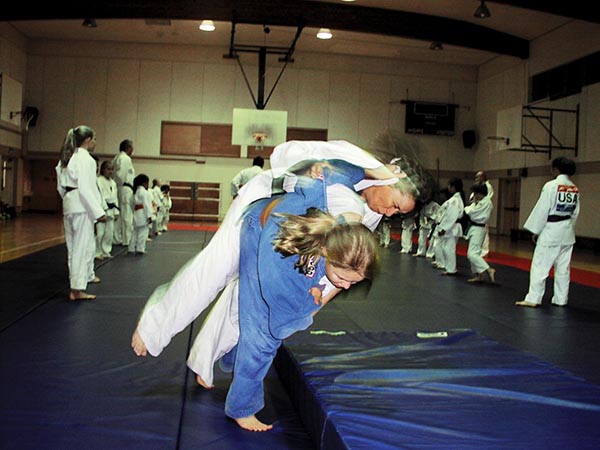
The family returned to California and settled in Santa Monica, where De Mars worked three jobs to support her kids, which now included yet another daughter, Julia. The kids all had to give judo a try — in 1984, De Mars was the first American ever to win at the World Judo Championships, so she had certain expectations — but Ronda was the only one to keep at it. And she did so, monomaniacally. In school, she didn’t go to a single party or dance and never went out on a date. All she did in her spare time was train. By age 16, she was so thickly muscled that the other kids called her Savage or Miss Man. They’d grab at her arms and yell, “Flex, flex, flex!” — so humiliating her that she started wearing a long-sleeve hoodie year-round. “Eighty-five degrees out, I wouldn’t take it off,” she says. “I wouldn’t let anybody see my arms.” Even today, when most fighters flex their muscles during weigh-ins, she rarely does, keeping them to her side instead, or curling them behind her back.
Her ears, too, were a problem. They’d get pulpy and swollen after a fight; one ear had to be cut open and drained, Ronda just wanted to go home, but her mom — who was as hard on Ronda as Ronda was on herself — made her train instead, and the drained ear bled all over the place, leaving it permanently cauliflowered and another source of embarrassment at school.
Then again, those arms did have their uses. When she was 14, she and her friend Jackie would go down to the Third Street Promenade, where Jackie acted as her Don King, sidling up to delinquent toughs and saying, “I bet my friend can beat you up for $10.” They’d all then retire to a park, where Ronda would take the hapless kid down in a chokehold or armbar, relieve him of his money, split the proceeds with her friend and go buy a couple of Frappuccinos.
During her sophomore year, she dropped out to concentrate on judo. One day, her mom sat her down for a talk. The Olympic trials were coming up. “If you don’t want to go to the Olympics,” her mom said, “I have no problem telling everyone to go fuck themselves.” “No, this is what I want to do,” Ronda said. “OK,” her mom said, “because if you want to be top in the world, it’s going to take a lot of gut-wrenching, balls-to-the-wall work, and that’s it.” Undeterred, at the age of 17, Ronda became the youngest judoka in the world to qualify for the 2004 Olympics in Athens.
It was not a pleasant experience. For one thing, she became bulimic while constantly struggling to make her weight class. Nor was she really allowed to vent any of her feelings or frustrations. At the time, she hadn’t perfected her trash-talking skill set. Her mom, during her competing years, used to push opponents and say stuff like, “Bitch, I’m going to break your fucking arm today.” But that was before women’s judo was introduced to the Olympics, where such talk is not tolerated, and until entering MMA, Ronda had to stifle herself and just carry on. Or cry, which she did often. In fact, almost every time she made even the slightest mistake in a practice session, or lost a fight, or came close to losing a fight, or sometimes even when she won a fight, she would break down in tears, an uncomfortable but uncontrollable reaction that has never gone away. It used to humiliate her, but she’s come to accept it as just one of those things left over from her early, nonspeaking years, when, she says, “crying was the only way I could tell people I was upset.” No matter what, though, she has always refused to submit in a fight, even if it meant her elbow would get broken. “Anytime anyone ever got me in an armbar, I’m like, ‘Well, I guess it’s going.’ Yeah. I never tapped out in judo.”
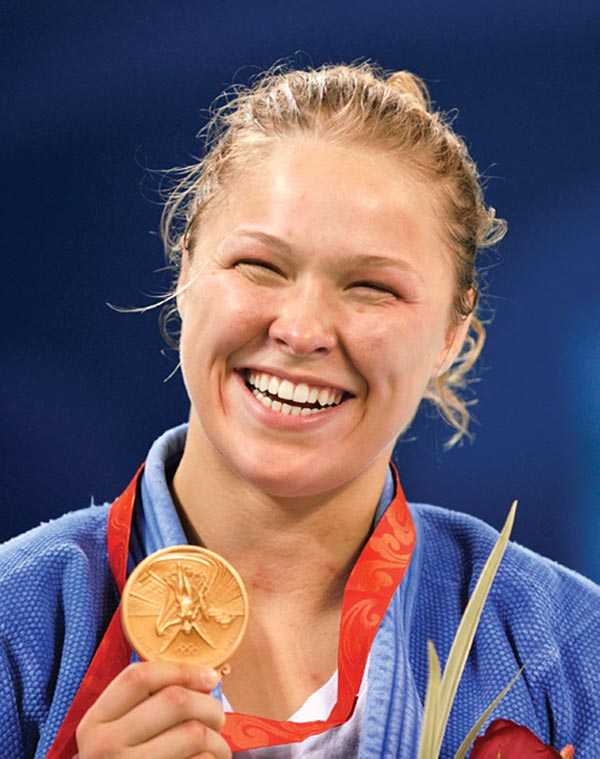
Four years after Athens came her big win at the Beijing Olympics. She was unhappy that it was only for a bronze medal, however, even though it made her the first American woman judoka to ever even place in the Games. Shortly thereafter, she went into a tailspin and quit her sport. She just didn’t want to fight anymore. It pissed her off to no end that, after all her hard work, her only reward from the U.S. Olympic Committee was “10 grand and a handshake.” She spent the next year living like lots of regular people do. She worked at a bar. She held down the graveyard shift at a 24 Hour Fitness. Drank, smoked weed, caroused, lived in her Honda for a while, went out with another guy who was just plain bad, and put up with her mom, who called every guy she dated Bob, even to their face, never bothering to learn their real names, since they were all jerks and wouldn’t be around for long, so why should she bother?
Eventually, she decided to give professional MMA a shot, which turned out to be exactly the thing to do. “Right now, I’m the baddest chick on the planet,” she says. “And no matter what else happens to me, I have that. If I don’t, I’m just a loser and I’m back in 2008, a drunk bartender living off of french fries and smoking menthols. And no one wants to smoke menthols. Menthols are disgusting.”
Inside the Glendale Fighting Club, Rousey’s head trainer, Edmond Tarverdyan, the club’s wiry, smooth-tempered owner and a champion Muay Thai fighter from Armenia who has been working with Rousey since 2010, is out on the floor holding up a pair of mitts. Rousey stands facing him, feet planted, head down, gloved hands up. On the walls surrounding her are posters from her fights. On another wall, De Mars, who continues to give her daughter advice (“If she wants to take it, fine, and if she doesn’t, she doesn’t”), has in large letters scrawled some of her sayings, or “mom-isms,” as Rousey calls them: “Winning is a habit.” “Nobody’s easy until after you beat them.”
“We did a lot of straight shots, now we need to do angles,” Tarverdyan tells Rousey. She nods, strikes.
“Beautiful,” he says. “All right, great. Stay in place. No extra. That’s good. OK, now, your right hand. Yeah, feel the shadow. Go jab and then go. OK, now you’re out there, you’re not afraid, you were never afraid. Beautiful, look at that!”
This dance goes on for almost an hour, with Rousey trying to do everything Tarverdyan asks, her eyes following him with nearly solicitous affection.
When the session is over, he says, “She’s a born fighter. Here, we feel bad for her sparring partners. She knocks everybody out, so we hire female world boxing champions because they can take the punishment.”
Rousey is nodding and beaming. Their relationship is oddly intimate. Every day, when Rousey buys him an iced coffee, she takes a straw and removes the paper up to the tip before inserting it into the cup. “Edmond’s little straw,” she will say. “I know there’s extra love on that straw, even if he never notices it and never will.” For his part, when Rousey was poor, Tarverdyan would order a ton of food at restaurants, telling her it was the Armenian way, just so she could get it to go at the end, never knowing it was his gift to her.
“The master plan is to retire undefeated,” she says, “and walk away and not have anything left to prove. It’ll be hard to know when it’s time, but it’ll help to have something else to get into, which is why I’m putting time into acting and the book and buying properties.”
“I’ll know when it’s time,” says Tarverdyan.
“Yeah,” says Rousey. “I trust you. I only have so much ring time that my body can endure. I’ve had four surgeries on my knees, arthritis in my neck, separated my shoulders, broken my nose. I’m just gonna hope that science advances faster than I can deteriorate. Because what am I gonna do? Put a perfect body into the ground? What’s the point of that?”
A while later, she’s telling what it’s like for her right after winning a fight and she’s in the shower. “I start to giggle my ass off,” she says. “It’s my first time alone. And for some reason, right then in the shower, it takes over, how happy I am, and I laugh my ass off. I mean, when was the last time you laughed like that at nothing that was funny?” She pauses. “I need to feel pressure. I need to feel like winning is the biggest deal in the fucking universe. I wouldn’t do as well without people watching. I’d still win. But I wouldn’t do it with such pizazz.”
Pizazz?
“Yeah, that’s it. I fight with pizazz. It’s a different sound from everyone else. It’s the sound of pizazz.”
Later in the afternoon, on the way home, Rousey says, “I think it’s funny when people think that because I’m a female athlete that I must be a lesbian, and I’m like, ‘No, I love men so much that I beat the fuck out of girls for a living just to take them all out.’ ” She’s joking, of course, but at the moment, she doesn’t have a boyfriend. There are various reasons for that, though. For one, she’s too busy. For another, she says, “the kind of guys I’m into have lots of desirable women willing to do backflips for them — and, I mean, if you can look like a man standing next to me, then you’re a real fucking man — but I’m just not doing any backflips.”
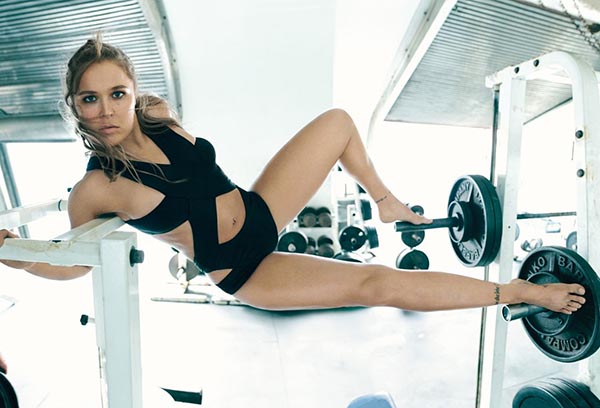
And then there’s the third and biggest reason. Rousey isn’t scared of much, but she is scared of men she likes.
“This one guy, he’s pretty well-known, he keeps texting me to go do this or that, and I’m such a pussy, I won’t say yes. And I want to. But I just pussy out. And then I met this guy at a gas station the other day — we had a moment with our credit cards not working right — and he asked me out. He was cute, but I was just a big ol’ pussy. I was like, ‘I don’t know. I gotta lot of shit, bro.’ I bro’d him, and I didn’t want to.” She sighs. “I don’t know what my problem is, and why I get so shy that I have trouble speaking, when I’m so bold in other areas.” She pops her hand on the steering wheel. “I have an actual issue, I do believe.”
Rousey really is complex, maybe even bordering on an amusingly appealing weirdo. She suffers from constant nightmares about zombie attacks. Is “deathly ticklish. I will turn into a fucking ninja if you try to tickle me.” Steals spoons from restaurants and in so doing is overjoyed. Worries what you will think if you look closely at the panties on the floor in her place, as in, “He probably thinks I got raped by Wolverine last night because my dog munches on the crotch of all my underwear, and they have teeth marks in them and, like, yeah, I don’t have a weird fetish or stainless-steel anything going on down there.”
She pulls over into the passing lane, where a car already is, and when that driver honks, she yells, “What are you honking at? You’re the one that’s an asshole!”
Rousey says she doesn’t care about not having a boyfriend. “If it’s just about sex, I could get laid any old time. It’s not about that. It’s not like I have this fleeting window of time where I can have a sex life, whereas I do have this fleeting window of time where I can accomplish all these other things. If anything, it’ll be better for my sex life if I get all this other shit done, because I’ll be more durable afterward.”
Back inside her place, she greets Mochi, then takes a request and goes to stand in front of a full-length mirror to display the face she puts on during every fight right before the referee claps his hands and bellows, “Let’s get it on!” Her fight face. “I call it mean mugging,” she says, dropping into it, almost shyly. “You’re staring at your opponent through your eyebrows.”
She backs away from the mirror and says people who think she’s impassive at such moments have it wrong. “I’m not looking blankly,” she says. “You have to have intent, because people can read what you’re thinking, and so I’m thinking of all the things I’m gonna do. Like with Cat Zingano. She’s a sweet girl, super-awesome chick. But every single time I looked at her, I thought, ‘I’m gonna send her home unrecognizable to her own child.’ My mind just goes there. To terrible things. But then when the fight’s over, I go from the most dangerous woman on the planet to the most cuddly, happy thing ever. I fall in love with everybody, even the person I just beat. I love that person for giving me that moment. I’ll never hate them for wanting the same thing I do. I love them for it. Because I need them in order to be able to do what I do for myself.”
But then, of course, there’s always the next fight and the next opponent to hate, and hate them she will, because that’s how she wins, and she will do anything to win. “I love heights, love bugs, loved to dig up earthworms, like snakes and slimy things, jumping off things, fire,” she says. “I’m fine with all of it, always thought I’d be great on Fear Factor, because I’d eat that goat dick just like that. It’s the thought of failing. That is my one and only big fear.”
Courtesy of: Rolling Stone
